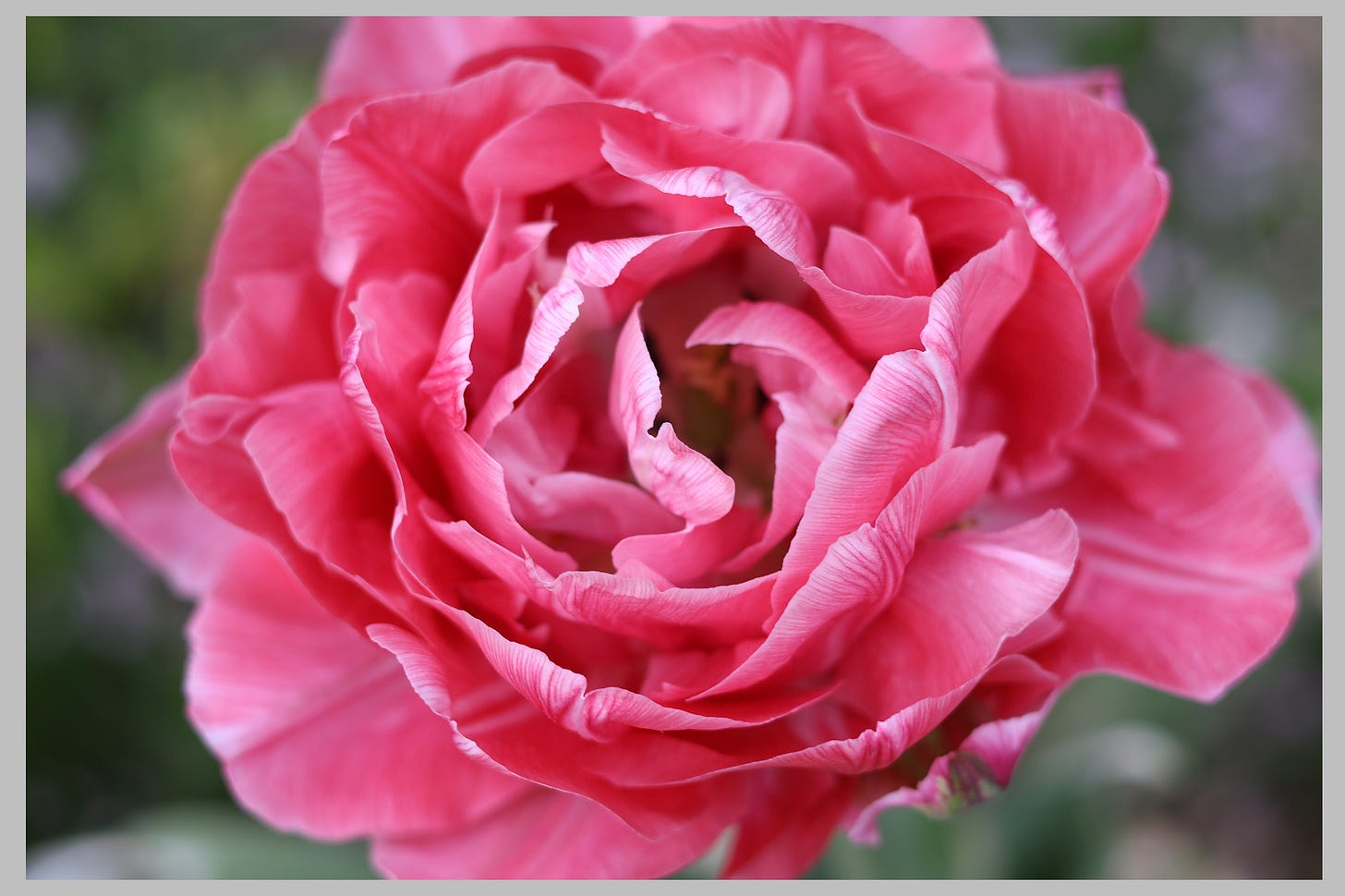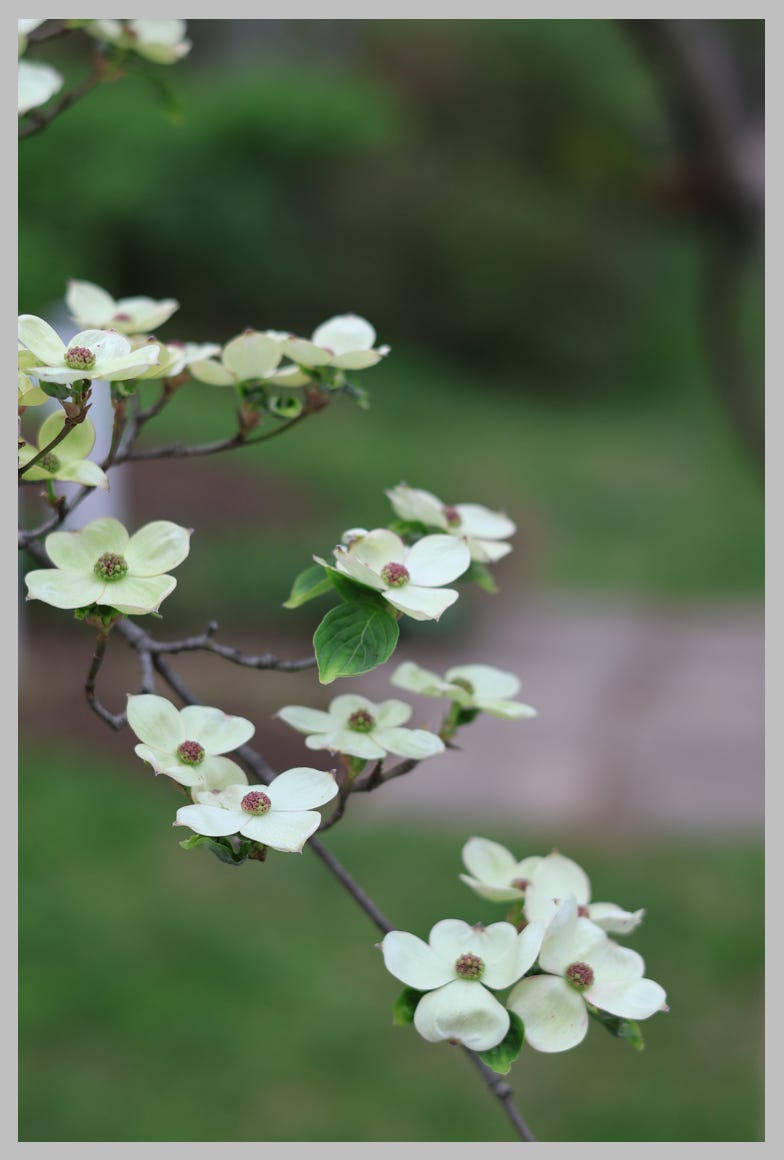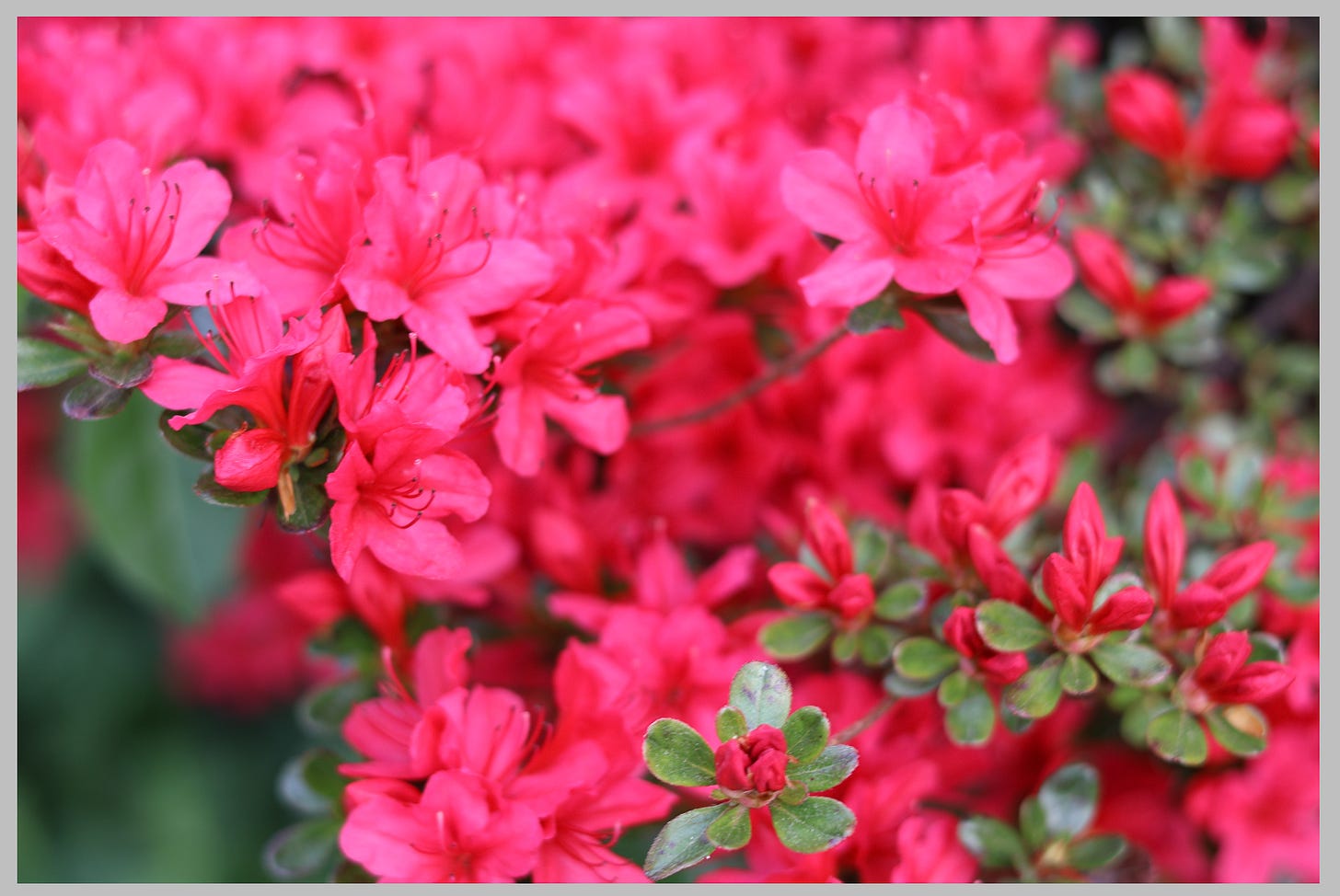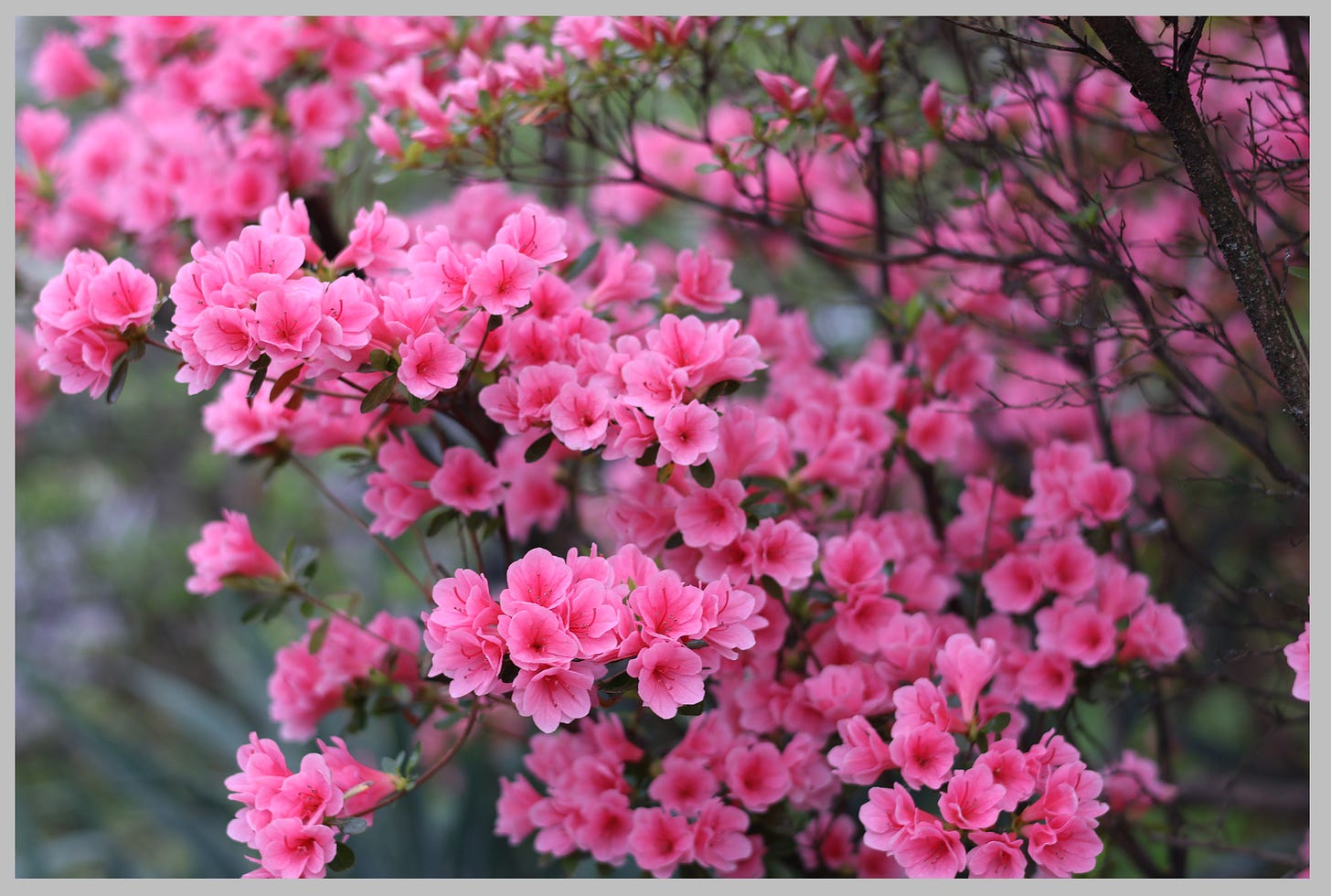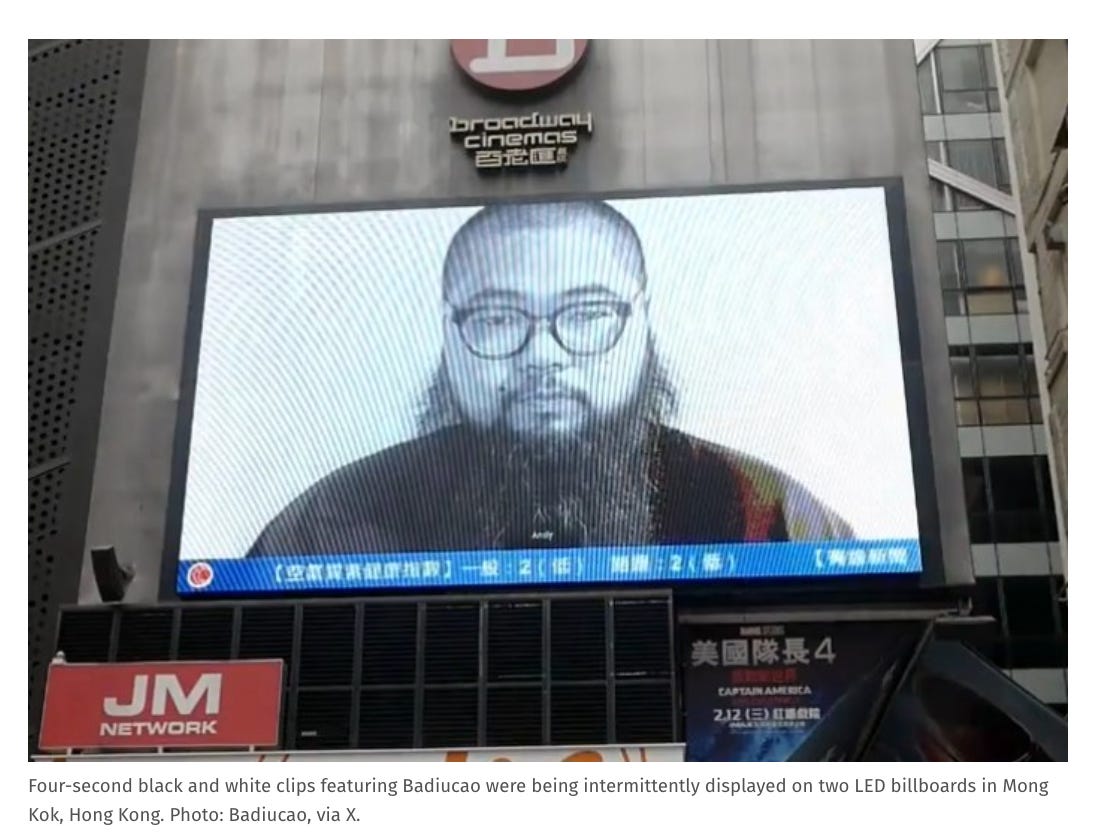Friends,
I’m going to forgo the lengthy commentary this week because, well, it’s just too nice outside and this is a holiday weekend.
I don’t need to be writing, and you certainly don’t need to spend your time reading about the bond market, the effectiveness of export controls, the pros and cons of signaling support for Taiwan, or debating whether the Chinese or American systems are better suited for a drawn-out cold war (hint: neither are particularly well suited for it at this moment).
Instead, I took a stroll yesterday with my camera and tried to capture some springtime. I recommend you do the same and enjoy the Easter holiday.
Take a walk in the woods.
Along a stream.
Or a bike ride.
Admire your neighbor’s flowers.
The dogwood trees.
The azaleas.
New buds on a gingko tree.
Or just sit on a bench and relax.
If you still find yourself worried about the stock and bond markets, then do what I did: make a cocktail… or two.
My pick this weekend was the Last Word.
Equal parts gin, Chartreuse (the green type), maraschino liqueur, and fresh squeezed lime juice (don’t use bottled lime juice, that is just sad and lazy).
Shaken and poured in a chilled coupe glass and garnished with a cherry (preferably one of those fancy Luxardo cherries… go ahead and splurge, you only live once).
Chartreuse is a truly spectacular liqueur, I’m pretty sure it’s the only color named after an alcohol.
Made from a secret recipe of 130 herbs by Carthusian monks in the foothills of the French Alps, the liqueur has a sweet taste that finishes with a spicy tingle at the back of your throat. Supposedly, the French mix it with hot chocolate to create something called a Verte Chaud, which I will have to try some day.
To me, Chartreuse tastes like springtime.
***
On Thursday this week, I will participate in the National Committee on U.S.-China Relations’ China Town Hall event in New York. Lingling Wei, Ryan Hass, and I will discuss U.S. China policy. Given some of the positions that leadership of NCUSCR has taken over the years, this should be fun.
Here’s Stephen Orlins, the 20-year President of NCUSCR, on CGTN America, the CCP’s mouthpiece that broadcasts to an American audience, or Orlins on Bloomberg while attending the China Development Forum in Beijing at the end of March cheerleading the “green shoots” of a Chinese stock market and how harmful export controls are. Orlins has been one of the Party’s “best friends” for a long time, faithfully broadcasting the Party’s message to an American audience.
Lingling is the Wall Street Journal’s Chief China Correspondent and co-author of the 2020 book, Superpower Showdown. She writes an excellent weekly column for the Journal on U.S.-China relations. Ryan was my predecessor at the National Security Council during the Obama Administration and now runs the China program at Brookings. I worked closely with him for a few years and respect his honesty and analysis.
Tune in if you have time or join one of the 130 watch parties across the country.
Thanks for reading!
Matt
As always, please support with a contribution if you find this weekly newsletter helpful.
MUST READ
U.S. and China Headed for ‘Monumental’ Split, Putting World Economy on Edge
Daisuke Wakabayashi, et al., New York Times, April 10, 2025
A deepening trade war could further weaken ties between the superpowers. The effects will reverberate everywhere.
A dizzying escalation of tariffs has unraveled a trade relationship between the United States and China forged over decades, jeopardizing the fate of two superpowers and threatening to drag down the world economy.
The brinkmanship displayed by the two countries has already far exceeded the battles they waged during President Trump’s first term. In 2018 and 2019, Mr. Trump raised tariffs on China over 14 months. The latest escalation has played out mostly over a matter of days, with levies that are far greater and apply to broader swath of goods.
On Wednesday, Mr. Trump countered China’s decision to match his 50 percent levy — a penalty for Beijing’s countermeasure to an earlier U.S. tariff — with an additional duty, raising the rate on Chinese imports to at least 145 percent.
Trump’s Tariffs Leave No Safe Harbor for American Importers
Peter S. Goodman, New York Times, April 14, 2025
For companies that have shifted factory production from China to other countries, the latest tariffs have undermined their strategy while sowing paralysis.
In a world besieged by turmoil, Jacob Rothman thought he had secured a refuge.
Mr. Rothman, 52, grew up in California but has spent more than two decades in China, overseeing factories that make grilling accessories and other kitchen items for Walmart and retailers around the globe. Well before the rest of the business world, he grasped the pressures bearing on the relationship between his native country and the one where he runs his business.
President Trump used his first term to impose tariffs on imports from China. President Joseph R. Biden Jr. advanced that policy. The pandemic exposed the pitfalls of American reliance on Chinese factories for an array of goods, from parts for ventilators to basic medicines.
Mr. Rothman and his company, Velong Enterprises, had correctly anticipated demand for alternatives to Chinese industry. He had forged a joint venture in Vietnam, and two more in India. He had set up a wholly owned factory in Cambodia. Come what may, he figured, he could shift production to limit his exposure to tariffs, conflicts and natural disasters.
An Unbreakable Wall? Challenges and Opportunities of Defending Freedom of Information in China
Resilience Innovation Lab, April 14, 2025
Over the past decade, China's information environment has significantly deteriorated due to increasing state control over digital communication. Notable intensifications of censorship and surveillance coincided with major events, including the 2019 Hong Kong protests, the COVID-19 pandemic in 2020, and the White Paper Movement in 2022. The Chinese Communist Party (CCP) has systematically tightened its grip on cyberspace, driven by concerns about foreign ideological influence and domestic regime security.
The CCP's approach includes extensive digital surveillance, narrative control through media manipulation, and reinforced digital border controls such as the Great Firewall. Recent legislative developments, including amendments to national security laws and new cybersecurity regulations, further restrict information flows, impacting businesses, journalists, academics, and civil society.
Businesses, especially multinational corporations, face heightened risks due to China's increasingly restrictive digital environment. Due diligence operations have been severely limited, with entities experiencing raids, exit bans, informal governmental warnings, and restricted access to crucial corporate information databases.
Civil society organisations, journalists, and academics are similarly constrained, facing routine surveillance, censorship, and significant operational disruptions. Academic freedom, journalistic independence, and civic activism are persistently challenged by vague legal boundaries, intensified surveillance practices, and direct threats from authorities.
Looking forward, the information freedom outlook in China remains concerning. Escalating geopolitical tensions, economic uncertainties, and the CCP’s deployment of artificial intelligence for surveillance purposes are expected to deepen information control. The erosion of conventional mitigation frameworks, exemplified by the decline of Hong Kong's autonomy, further compounds these challenges.
Policy Recommendations:
National governments should incorporate digital rights clauses into diplomatic engagements and trade agreements, supported by annual assessments of China's digital policies.
Multilateral institutions (WB, IMF, WTO) must establish regulatory standards emphasizing open information access and enhance mechanisms monitoring China's digital repression.
Businesses should conduct continuous risk assessments, facilitated by Chambers of Commerce and industry associations, adopting a Business and Human Rights Charter to align with global human rights standards.
Civil society, media, and academia should proactively preserve at-risk information, establish international collaborations, and develop strategies to counteract censorship, thus safeguarding historical and contemporary records for future generations.
The more China investigates corruption, the more it finds. Will the battle ever be won?
Xinlu Liang, South China Morning Post, April 11, 2025
Even as Xi Jinping’s anti-corruption purges go further and deeper, China’s legacy of corruption remains a widespread and serious problem.
In Beijing, jittery government officials and mid-level managers have been reaching out to a small pool of seasoned criminal lawyers.
“Usually it comes after a colleague or a close associate has been rounded up, and they want to be at least able to explain things the graft fighters may find suspicious,” said a veteran criminal lawyer in Beijing, who requested anonymity due to the sensitivity of the matter.
“That is something we hadn’t seen until these past few years.”
Political artist Badiucao says billboards with his ‘hidden’ political message removed, as gallery launches attack
Hong Kong Free Press, April 3, 2025
In the videos, Badiucao is seen silently mouthing a quote from Chairman Mao Zedong: “You must take part in revolution.” Organisers called the artist “a small person who defrauds the people he works with” and accused him of providing them with “false information.”
Chinese artist Badiucao has said that two Mong Kok billboards showing a clip he made with a hidden political message have been removed.
Organisers would not confirm the removal but have denied the work is political, calling the Australian-based artist’s move “disrespectful.”
Four-second black-and-white clips featuring Badiucao had been intermittently displayed on two LED billboards in Kowloon for Art Week. In the videos, the artist is seen silently mouthing a quote from Chairman Mao Zedong: “You must take part in revolution.”
It is a quote from an essay featured in the Chinese Communist Party leader’s 1937 philosophical work On Practice. It is also the title of Badiucao’s graphic novel.
The Mong Kok billboards were part of Art Innovation Gallery’s “Luminance” outdoor exhibition, which was launched last Friday, bringing together artists, designers, and brands.
On Wednesday, Badicauo said in an X post that he understood the clip had been removed, representing the completion of his work.
“The whole campaign captures the moment of repression [of] free expression in Hong Kong, whether it is coming from the authorities or inner fear within society,” he wrote. “But it also demonstrates the possibility of using creativity to infiltrate authoritarian systems.”
Badiucao, who had used the pseudonym “Andy Chou” for the billboard project, said on Monday that he wanted to test the law whilst the flagship Art Basel fair was taking place.
“There is no true creativity without freedom. Anything less is subpar, consumerist, and for the purchase of vapid billionaires and oligarchs. It is thus an indictment of Art Basel when it continues to stage its event in Hong Kong at a time when freedom of expression is under assault in the territory,” he said on Monday.
‘Not political campaigners’
Italy-based Art Innovation told HKFP on Wednesday that the artist gave “false information in order to be admitted to the exhibition,” describing the stunt as “really low.”
In an emailed response, they said that they “are not political campaigners and we respect all forms and governmental rules, we have no interest in disseminating political views… it was the artist himself who added political descriptions and messages on his social media that are NOT in the exhibition, he only posted them later on social media.”
They did not respond as to whether they knew of the artist’s true identity from the beginning, nor would they say if the artwork had been removed.
They accused Badiucao of seeking media acclaim or trying to perform an act of dissent. “We are very embittered by this behaviour of the artist (more than political messages) who provided false information, making fun of the seriousness of professionals who have been working on the project for months and months with sacrifice and sweat and we believe it is really disrespectful to all the other artists who have respected the rules and the contract.”
Calling Baiducao “a small person who defrauds the people he works with,” they included the artists’ original statement, which said the clip “explores the essence of presence – how we experience time, sensation, and awareness in fleeting moments.”
COMMENT –The Italy-based Art Innovation seems to be offended that anyone would use art to make a political statement.
Here’s Art Innovation’s mission from their website:
Art Innovation sees art as a powerful vehicle for branding.
Brands can be associated with engaging and innovative artistic experiences that not only enhance the brand, but also link it to positive emotions and deep cultural values.
Art Innovation, a leading international company promoting brands and design through exclusive exhibitions on mega LED billboards in New York, Hong Kong, Seoul, and Miami, is introducing a new collaboration model that offers financial compensation to artists.
Art Innovation aims to recognize the strategic and creative value of design studios and professional artists collaborating with brands and companies. Specifically.
Hmmm… so art is about promoting brands so that companies can sell more stuff. I always thought that art was for more important things… I suspect Badiucao agrees with me.
Here’s some of his work at a recent show in Warsaw called “Telling China’s Story Well.”
This includes my favorite piece of his, “Xi shooting Winnie the Pooh”
This is piece is called “The Tiger Chair” (2018), it is a piece of furniture that Chinese Communist Party authorities use to torture victims during interrogation and was purchased by the artist from an online auction in the PRC.
Maybe Art Innovation should spend less time worrying about selling brands and more time advocating for important political positions.
Just when you think that its just corporate ad agencies masquerading as serious art promoters that have a problem with Badiucao’s work, the President of George Washington University banned the display of his work in the run-up to the Beijing Winter Olympics because his art offended Chinese Communist students who hated to have their regime criticized.
The Chinese Communist Party’s influence over culture and the arts is incredibly strong.
AUDIO – To Catch a Thief: China’s Rise to Cyber Supremacy
Nicole Perlroth, Rubrik, April 2025
Episode 4: Naming and Shaming (March 31, 2025)
Episode 5: A Cyber Détente (April 7, 2025)
Episode 6: The Gunslingers (April 14, 2025)
COMMENT – Nicole Perlroth added three more episodes of her excellent podcast documenting the PRC’s brazen use of cyber-enabled economic espionage to steal from and undermine American and other foreign companies.
Authoritarianism
Top Chinese general removed in Xi Jinping’s latest purge
Demetri Sevastopulo, Financial Times, April 10, 2025
China: Police Arrest Tibetans for Internet, Phone Use
Human Rights Watch, April 13, 2025
A Chapter Closes: Hong Kong’s Democratic Party to Disband
Tiffany May, New York Times, April 13, 2025
Hong Kong’s national security legislation does not affect artistic creation, new police chief says
Kelly Ho, Hong Kong Free Press, April 8, 2025
Trump’s tariff blitz could hardly have come at a worse time for China
Lily Kuo, Washington Post, April 11, 2025
Ukraine Accuses Russia of Systematically Recruiting Soldiers from China
Isabel Coles, Wall Street Journal, April 10, 2025
British MP denied entry to Hong Kong
Chan Ho-him, Financial Times, April 12, 2025
COMMENT - It is a bad idea to visit Hong Kong if you have ever said anything negative about the PRC.
Revealed: Chinese researchers can access half a million UK GP records
Tom Burgis, The Guardian, April 14, 2025
China's Monologue Machine
David Bandurski, China Media Project, April 2, 2025
‘Rightfully theirs’: China targets Australia
Jamie Seidel, News.com.au, April 5, 2025
Li Ka-shing’s Beijing Rift Threatens His Deal of a Lifetime
Shirley Zhao, Dong Cao, and Manuel Baigorri, Bloomberg, April 10, 2025
Environmental Harms
Dramatic cuts in China’s air pollution drove surge in global warming
Madeleine Cuff, New Scientist, March 31, 2025
The rate at which the planet is warming has sped up since 2010, and now researchers say that China's efforts to clean up air pollution are inadvertently responsible for the majority of this extra warming.
A recent surge in the rate of global warming has been largely driven by China’s efforts to reduce air pollution, raising questions about how air quality regulations are influencing the climate and whether we fully understand the impact of removing aerosols from the atmosphere. This extra warming, which was being masked by the aerosols, accounts for 5 per cent of global temperature increase since 1850.
In the early 2000s, China had extremely poor air quality as a result of rapid industrialisation, leading to a public outcry in the run-up to the 2008 Beijing Olympics. In response, Chinese authorities fitted scrubbers to coal power plants to curb the dirtiest emissions and tightened rules governing vehicle exhausts, leading to a 75 per cent drop in sulphate emissions.
Major rice producers have world’s worst heavy metal pollution, Chinese scientists warn
Shi Huang, South China Morning Post, April 19, 2025
China's coal hub Shanxi sees record coalbed methane output in Q1
Azer News, April 19, 2025
Foreign Interference and Coercion
Taiwan’s balancing act: Keeping the US in, China out, and domestic technology superior
Jana Puglierin, et al., European Council on Foreign Relations, April 4, 2025
No Jail Time for Queens Man Convicted of Spying for China
Santul Nerkar, New York Times, April 1, 2025
Philippines calls joint US drills 'defense rehearsal' as China tensions simmer
Karen Lema, Reuters, April 15, 2025
Australian opposition's pivot to China tested as May poll nears
Sophie Mak, Nikkei Asia, April 14, 2025
Taiwan says China using generative AI to ramp up disinformation and 'divide' the island
Reuters, April 7, 2025
Human Rights and Religious Persecution
Exiled Hong Kong activists write to Foreign Secretary on UK sanctions policy
Hong Kong Watch, April 14, 2025
Tibetan Buddhist leader missing for 8 months has died, monastery confirms
Tenzin Pema, et al., Radio Free Asia, April 3, 2025
Man jailed for 10 months for sedition, criminal damage over graffiti on Taiwan independence, Chinese Communist Party
Hillary Leung, Hong Kong Free Press, April 2, 2025
Netizens demand China reinstate Tibetan language use in schools
Tenzin Pema, Radio Free Asia, April 4, 2025
RFA radio transmissions to China, Tibet halted
Radio Free Asia, April 4, 2025
US report says human rights further curtailed in Hong Kong, as city slams ‘slanders and smears’
James Lee, Hong Kong Free Press, April 2, 2025
Industrial Policies and Economic Espionage
Inside Factories in China, a Struggle to Survive Trump’s Tariffs
Keith Bradsher, New York Times, April 9, 2025
China’s New Economic Weapons
Evan S. Medeiros and Andrew Polk, The Washington Quarterly, April 9, 2025
Tesla Halts Orders in China on U.S. Imported Models
Claire Fu, New York Times, April 11, 2025
DuPont Is Again in China’s Firing Line in Trade War 2.0
James T. Areddy, Wall Street Journal, April 10, 2025
The U.S. and China Are Going to Economic War—and Everyone Will Suffer
Jason Douglas, et al., Wall Street Journal, April 11, 2025
Shein’s Bargain-App Formula Crumbles Under Trump
Shen Lu, et al., Wall Street Journal, April 10, 2025
China’s Tech Giants Move to Support Exporters as Trade Tensions Rise
Tracy Qu, Wall Street Journal, April 11, 2025
Australian miners benefit from new Chinese restrictions on rare earth exports
Nic Fildes, Financial Times, April 10, 2025
Trump Has Added 145% Tariff to China, White House Clarifies
Ana Swanson, New York Times, April 10, 2025
Steeling China for a Fight, Xi Faces His Biggest Test Since Covid
David Pierson, New York Times, April 11, 2025
EU leaders plan trip to Beijing in July for summit with Xi
Finbarr Bermingham, South China Morning Post, April 11, 2025
Chinese firms set aside US$2.7 billion for stock buy-backs as Trump’s tariffs roil markets
Zhang Shidong, South China Morning Post, April 11, 2025
China stagflation risks creep up as Trump tariff war escalates
Kentaro Shiozaki, Nikkei Asia, April 10, 2025
Bond Analysts Debate If China Had Role in Treasuries Swings
Ruth Carson and Masaki Kondo, Bloomberg, April 11, 2025
Facing Trump tariffs, Vietnam eyes crackdown on some China trade
Francesco Guarascio, Reuters, April 11, 2025
Chinese exchanges restrict daily stock sales as trade war with US escalates, sources say
Reuters, April 11, 2025
Why Beijing Thinks It Can Beat Trump
Scott Kennedy, Foreign Policy, April 10, 2025
Can Trump’s Shipbuilding Order Compete with Chinese Investment?
William Henagan, Council on Foreign Relations, April 10, 2025
China Halts Critical Exports as Trade War Intensifies
Keith Bradsher, New York Times, April 11, 2025
Apple’s supply chain under pressure from tariffs amid iPhone price hike speculation
Ben Jiang, South China Morning Post, April 11, 2025
China’s Exports Surge as Orders Front-Loaded Before Tariffs
Wall Street Journal, April 14, 2025
At China’s Wholesale Hub, U.S. Orders Have Suddenly Halted. One Example: Socks.
Yoko Kubota, Wall Street Journal, April 14, 2025
U.S. Allies Are Sitting Out Trump’s Trade War with China
Yaroslav Trofimov, Wall Street Journal, April 14, 2025
The Chinese CEO Who Believes Her Cancer Drug Can Beat Merck’s Bestseller
Clarence Leong, Wall Street Journal, April 11, 2025
Why Europe Fears a Flood of Cheap Goods from China
Michael D. Shear and Jeanna Smialek, New York Times, April 14, 2025
How China went from courting Trump to ‘never yield’ tariff defiance
Reuters, April 14, 2025
Trump’s Dilemma: A Trade War That Threatens Every Other Negotiation with China
David E. Sanger, New York Times, April 14, 2025
Trump’s Trade War Deepens Threat to U.S. Brands in China
Liyan Qi, et al., Wall Street Journal, April 14, 2025
Xi Jinping urges Vietnam to oppose Donald Trump’s tariff ‘bullying’
A. Anantha Lakshmi, et al., Financial Times, April 14, 2025
A Crisis at a British Steel Mill Has Cast a Shadow Over U.K.-China Relations
Mark Landler, New York Times, April 15, 2025
Trump’s Trade War with China Could Be Good for India. But Is It Ready?
Alex Travelli and Hari Kumar, New York Times, April 15, 2025
China Orders Boeing Jet Delivery Halt as Trade War Expands
Bloomberg, April 15, 2025
China Suppliers Mock Tariffs with Nike, Lululemon Deals on TikTok
Bloomberg, April 14, 2025
China's murky bankruptcies expose hazards for foreign investors
Engen Tham, Reuters, April 15, 2025
Fact Sheet: President Donald J. Trump Closes De Minimis Exemptions to Combat China’s Role in America’s Synthetic Opioid Crisis
The White House, April 2, 2025
Cyber and Information Technology
Trump administration backs off Nvidia's 'H20' chip crackdown after Mar-a-Lago dinner
Emily Feng and Bobby Allyn, NPR, April 9, 2025
Nvidia's Mar-a-Lago Dinner Looks Like a Raw Deal for US AI
Parmy Olson, Bloomberg, April 14, 2025Nvidia boss Jensen Huang meets Shanghai mayor in wake of new US export controls on chips
He Huifeng, South China Morning Post, April 19, 2025
The tech chief executive’s visit is seen by Chinese media as a sign the US company remains committed to the country.
Nvidia chief executive Jensen Huang met the mayor of Shanghai on Friday, a day after holding talks with senior figures in the central government.
The trip, Huang’s second visit to China in the space of three months, is taking place as the United States further tightens controls on semiconductor exports.
On Thursday, Huang met He Lifeng, the Chinese vice-premier in charge of US-China trade talks, a move Chinese media widely interpreted as a signal that the tech giant remained committed to the Chinese market.
The following day Shanghai mayor Gong Zheng welcomed Huang to the city and told him that Shanghai had a favourable business and industrial environment, according to the official municipal website.
It said Huang emphasised Nvidia’s ties to Shanghai, describing the city as one of the company’s key research and development hubs, and saying it was vital to Nvidia due to its market size, high-quality customer base and robust industry ecosystem.
He also highlighted the immense potential of artificial intelligence, and said the world should improve cooperation and share knowledge in the cause of progress and global prosperity.
Gong said Nvidia and other global tech giants were welcome to seize the opportunities presented by China’s vast market and Shanghai’s opening-up. He also encouraged companies to leverage global resources and deepen cooperation with local enterprises.
The mayor said Shanghai remained committed to creating a world-class business environment that was market-oriented, law-based and internationalised.
Huang also toured Nvidia’s research and development facilities in Shanghai and held a closed-door meeting with Chinese customers.
After meeting the vice-premier on Thursday, Huang told financial news site Yicai.com: “We regularly meet with government leaders to discuss our company’s products and technologies.”
COMMENT – Nvidia and its CEO seem to do everything they can to sidestep and undermine U.S. export controls on the PRC.
If Nvidia were a PRC company and its CEO was doing this in the United States, I suspect he would be disappeared only to be trotted out a few months later on trumped up charges of corruption.
Intel CEO invested in hundreds of Chinese companies, some with military ties
Max A. Cherney, Reuters, April 10, 2025
New AI fund in China to pour US$8 billion into early-stage projects
Ann Cao, South China Morning Post, April 11, 2025
Wi-Fi Giant TP-Link’s US Future Hinges on Its Claimed Split from China
Kate O'Keeffe, Bloomberg, April 11, 2025
China’s New Semiconductor Policy Could Potentially Crush Intel’s Business, As It Now Targets Firms American Chipmakers & Favours the Likes of TSMC
Muhammad Zuhair, Wccftech, April 11, 2025
What Apple Has at Stake in China
Rolfe Winkler, Wall Street Journal, April 12, 2025
China amends ‘place of origin’ in boost to local semiconductor manufacturers
Wency Chen, South China Morning Post, April 11, 2025
China can flick EU 'kill switch' -- Europe mulls cyberattack risk
Jens Kastner, Nikkei Asia, April 12, 2025
Top Donald Trump official tells Europe to choose between US or Chinese communications tech
Kieran Smith, et al., Financial Times, April 14, 2025
The Next TikTok Shutdown Is Likely to Be Longer
Dave Lee, Bloomberg, April 15, 2025
How America Can Stay Ahead of China in the AI Race
Nikita Lalwani, Foreign Affairs, April 15, 2025
Military and Security Threats
Head of British military makes first Beijing visit in 10 years
Lucy Fisher, et al., Financial Times, April 10, 2025
Chinese Shipping Company Wants to Lease the Former U.S. Base at Adak
The Maritime Executive, April 11, 2025
‘Invasion’ barges, subsea cable cutters and surprise naval drills: how China is testing Donald Trump
Angela Dewan, The Guardian, April 13, 2025
Chinese police put 3 U.S. operatives on wanted list over cyberattacks
Huaxia, Xinhua Net, April 15, 2025
China Accuses U.S. Spy Agency of Winter Games Cyberattacks
Brian Spegele, Wall Street Journal, April 15, 2025
China’s Halt of Critical Minerals Poses Risk for U.S. Military Programs
Helene Cooper, New York Times, April 14, 2025
One Belt, One Road Strategy
China builds space alliances in Africa as Trump cuts foreign aid
Joey Roulette, et al., Reuters, February 11, 2025
China's loan rollovers keep Pakistan afloat amid record debt
Adnan Aamir, Nikkei Asia, April 11, 2025
China delays approval for Geely, BYD investment plans in Latin America, sources say
Reuters, April 11, 2025
Trapped in debt: China’s role in Laos’ economic crisis
Keith Barney, et al., Lowy Institute, April 13, 2025
China frets about its dependence on Africa’s resources as US muscles in
Fan Chen, South China Morning Post, April 15, 2025
Opinion
Why America Needs a New Strategy of Allied Scale to Offset Beijing’s Enduring Advantages
Kurt M. Campbell and Rush Doshi, Foreign Affairs, April 11, 2025
Globalists Brought Trump’s Trade Revolution on Themselves
Robert D. Atkinson, National Review, April 9, 2025
Revamp US assistance to counter China
Daniel Twining, Washington Examiner, April 8, 2025
This Instability May Be Worth It. Here’s Why.
Ross Douthat, New York Times, April 10, 2025
Why Xi holds a stronger hand than Trump
Gideon Rachman, Financial Times, April 14, 2025
Europe must choose between America and China
Oren Cass, Financial Times, April 11, 2025
Time for the rest of the West to club together
Hugo Dixon, Reuters, April 13, 2025
Xi Jinping’s Anti-Tariff Tour
Wall Street Journal, April 14, 2025
Trump chaos is lending weight to Xi’s prophecy of ‘profound changes unseen in a century’
Shi Jiangtao, South China Morning Post, April 15, 2025



